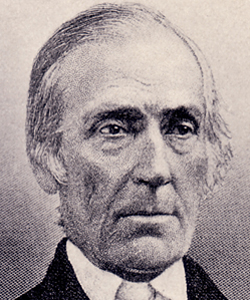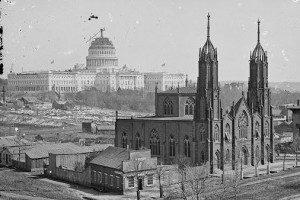 I found Levi Coffin, a leader of the Underground Railroad in Indiana, as I was going through the database today and the role that he played in the Underground Railroad. Upon further research I found this great website created by Wayne County. There are several pictures of the Levi Coffin House and where the Coffins used to hide the thousands of slaves that came through Indiana on their way to Canada. The site includes several links to other sites about Levi Coffin and other Underground Railroad characters. One link I thought was very useful was to K-12 Lesson Plan link.
I found Levi Coffin, a leader of the Underground Railroad in Indiana, as I was going through the database today and the role that he played in the Underground Railroad. Upon further research I found this great website created by Wayne County. There are several pictures of the Levi Coffin House and where the Coffins used to hide the thousands of slaves that came through Indiana on their way to Canada. The site includes several links to other sites about Levi Coffin and other Underground Railroad characters. One link I thought was very useful was to K-12 Lesson Plan link.
7
Jul
08
Levi Coffin: President of the Underground Railroad
Posted by Published in Antebellum (1840-1861), Lesson Plans, Places to Visit Themes: Slavery & Abolition2
Jul
08
The Civil War in Carlisle
Posted by Published in Civil War (1861-1865), Images, Recent Scholarship Themes: Battles & Soldiers, Carlisle & Dickinson In the summer of 1863, the town of Carlisle, PA became the one of the northern-most posts of the Confederate Army. An account of the occupation of Carlisle during the Battle of Gettysburg by Richard Edling appears on civilwaralbum.com. 145 years ago this week, Dickinson College became host to General Ewell’s troops. Edling provides modern day pictures of the Civil War sites in Carlisle. Check out House Divided for images of Dickinson College from the Civil War.
In the summer of 1863, the town of Carlisle, PA became the one of the northern-most posts of the Confederate Army. An account of the occupation of Carlisle during the Battle of Gettysburg by Richard Edling appears on civilwaralbum.com. 145 years ago this week, Dickinson College became host to General Ewell’s troops. Edling provides modern day pictures of the Civil War sites in Carlisle. Check out House Divided for images of Dickinson College from the Civil War.
2
Jul
08
 I was searching the Brady-Handy Collection on the Library of Congress website and found an interesting picture of Washington D.C. that I wanted to highlight. You can see the Trinity Episcopal church with the US Capital in the background. To see the full image, go here. Seven other images are available in that collection, including one of Lincoln’s funeral.
I was searching the Brady-Handy Collection on the Library of Congress website and found an interesting picture of Washington D.C. that I wanted to highlight. You can see the Trinity Episcopal church with the US Capital in the background. To see the full image, go here. Seven other images are available in that collection, including one of Lincoln’s funeral.
1
Jul
08
Lincoln Douglas in 1854
Posted by sailerd Published in Antebellum (1840-1861), Historic Periodicals Themes: Contests & Elections I want to point out an article that the Chicago Press & Tribune published on July 1, 1858. Almost two months before the first 1858 debate between Abraham Lincoln and Stephen Douglas, the Tribune provided an account of the exchange between those two Illinois politicians in October 1854. Even though the Tribune described the event “from memory,” some might still find the article an interesting read.
I want to point out an article that the Chicago Press & Tribune published on July 1, 1858. Almost two months before the first 1858 debate between Abraham Lincoln and Stephen Douglas, the Tribune provided an account of the exchange between those two Illinois politicians in October 1854. Even though the Tribune described the event “from memory,” some might still find the article an interesting read.
1
Jul
08
At CivilWar.com there is some pretty cool features like this interactive map thhat shows where battles occurred during the Civil War. I am not sure how reliable a lot of the information is, but there is an Archives that has a list of more than 100 online resources for topics related to the Civil War. While CivilWar.com might not be that useful, the list of other sites is a quick and easy way to find other sources relating to the Civil War.
27
Jun
08
“But will the election of Mr. Lincoln endanger the Union?”
Posted by sailerd Published in Antebellum (1840-1861), Historic Periodicals Themes: Contests & ElectionsThe Atlantic’s archive also has selected full text articles published between 1857 and November 1995. While a number of interesting articles are available, I wanted to point out one from the October 1860 issue. A month before the November 1860 election, James Russell Lowell discussed the four candidates and potential outcomes. Lowell realized that “this election [was] a turning-point in our history” because “[even though] there [were] four candidates, there [were] really…two parties, and a single question that divides them.” While many Americans were concerned about a Republican victory, Lowell concluded that Abraham Lincoln “[had] proved both his ability and his integrity” and his party “[had] no hostility to the South.” While thisarticle is a long one, some might be able to use it in their classes.
27
Jun
08
Everyday Life in the Civil War
Posted by Published in Civil War (1861-1865), Images, Letters & Diaries, Maps, Rare Books Themes: Battles & Soldiers CivilWarHome.com is a great site with a ton of information on life during the civil war. Their main page is separated in several categories including Medicine, Biographies, and Essays each with numerous links and descriptions for subcategories.
CivilWarHome.com is a great site with a ton of information on life during the civil war. Their main page is separated in several categories including Medicine, Biographies, and Essays each with numerous links and descriptions for subcategories.
26
Jun
08
If you have not visited the Atlantic magazine’s website, you might want to take a look at the free archive of articles published after November 1995. I have not had a chance to look through everything, but I wanted to point out two articles that could be used as a way to start a discussion in class about Abraham Lincoln. Garry Wills discusses President Lincoln’s Second Inaugural address in “Lincoln’s Greatest Speech?” (Sept. 1999) while Joshua Wolf Shenk, in “Lincoln’s Great Depression” (Oct. 2005), describes Lincoln in a way that may surprise some students. Shenk also discusses his conclusions about Lincoln in an interview.
26
Jun
08
Civil Liberties: Then and Now
Posted by Published in Civil War (1861-1865), General Opinion, Recent News, Video Themes: Laws & LitigationThe issue of civil liberties during wartime is as crucial today as it was during the Civil War. The detention of suspected terrorists in Guantanamo Bay prison has led to endless debate and confusing equivocation regarding the rights of detainees and civil liberties during war time. The confusion is nothing new. Curbing civil liberties during war time is something the United States experienced not only in the Civil War, but also in World Wars One and Two. Is the introduction of internal securities measures curbing civil liberties ever justified? Is it necessary? Civil War historian and Pulitzer Prize-winning author Mark Neely took some time to answer these questions for the House Divided project at our June 13th workshop.
The Heritage Foundation, a conservative political think-tank, examines Lincoln’s restrictions of civil liberties during the War. The Hon. Frank J. Williams uses his article to examine also the restriction of civil liberties enacted by the Bush Administration as a part of the War on Terror. Williams acknowledges the unique situation of the rebellion faced by the Federal government during the 1860s, and draws a parallel between the uniqueness of that era and that of our current war.
26
Jun
08
Utah War
Posted by Published in Antebellum (1840-1861), Historic Periodicals Themes: Battles & Soldiers Exactly 150 years ago today, federal troops entered Salt Lake City in order to securely install federally appointed governor, Alfred E. Cumming, and removed the Mormon governor of nearly a decade, Brigham Young. The article The Brink of War explains the Utah War and the history of how this Morman Zion gained its statehood. What the article does not clarify however is the conflicting terminology of the Mormon War and the Utah War. The Mormon War was a bloody and bitter conflict between the federal government and the Mormon population in the Utah territory, during Buchanan’s presidency. What the article describes as the “bloodless” Utah War is the negotiations that occurred at the tail end of the conflict. House Divided has several newspapers, letters, and other documents about the Mormon War.
Exactly 150 years ago today, federal troops entered Salt Lake City in order to securely install federally appointed governor, Alfred E. Cumming, and removed the Mormon governor of nearly a decade, Brigham Young. The article The Brink of War explains the Utah War and the history of how this Morman Zion gained its statehood. What the article does not clarify however is the conflicting terminology of the Mormon War and the Utah War. The Mormon War was a bloody and bitter conflict between the federal government and the Mormon population in the Utah territory, during Buchanan’s presidency. What the article describes as the “bloodless” Utah War is the negotiations that occurred at the tail end of the conflict. House Divided has several newspapers, letters, and other documents about the Mormon War.







